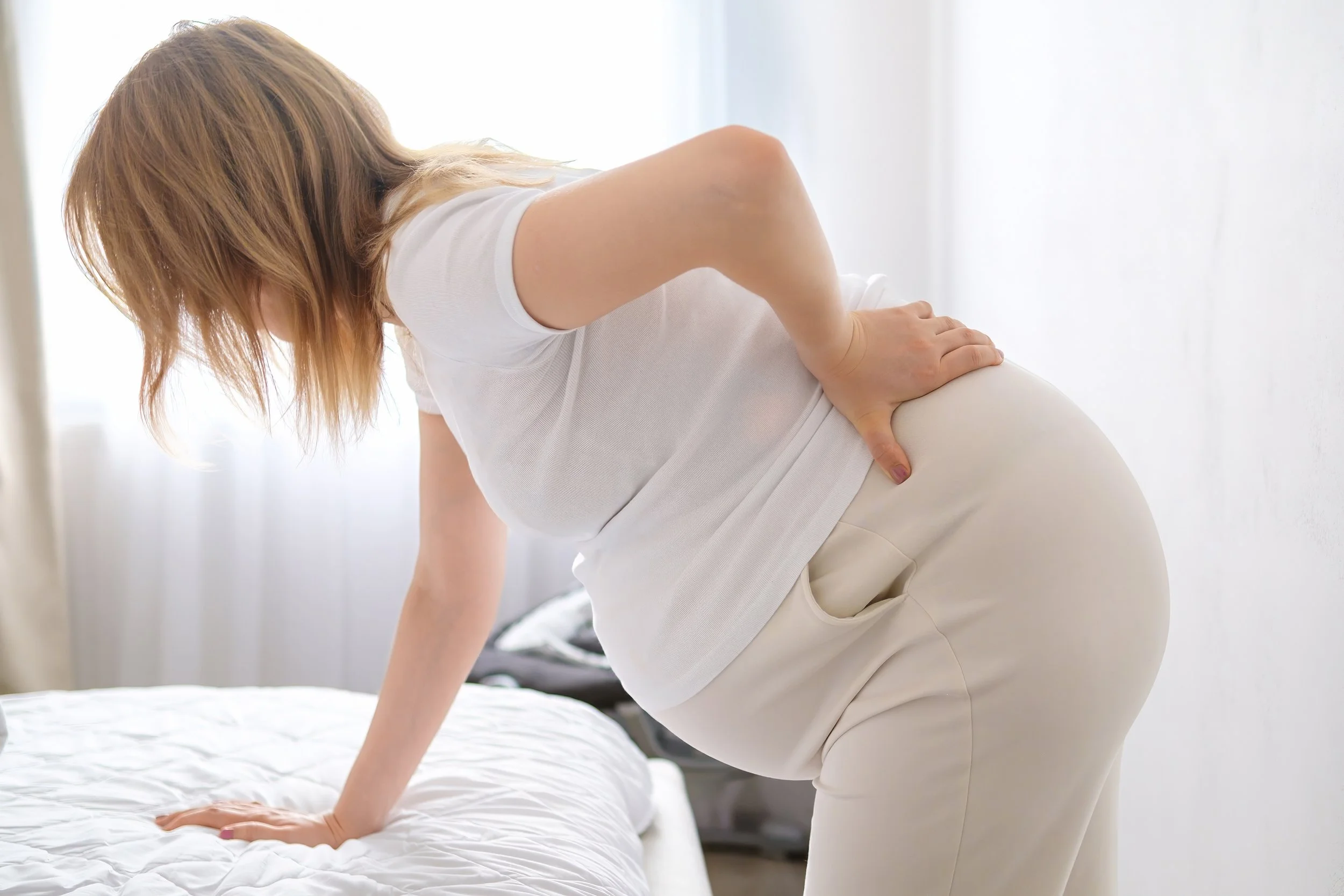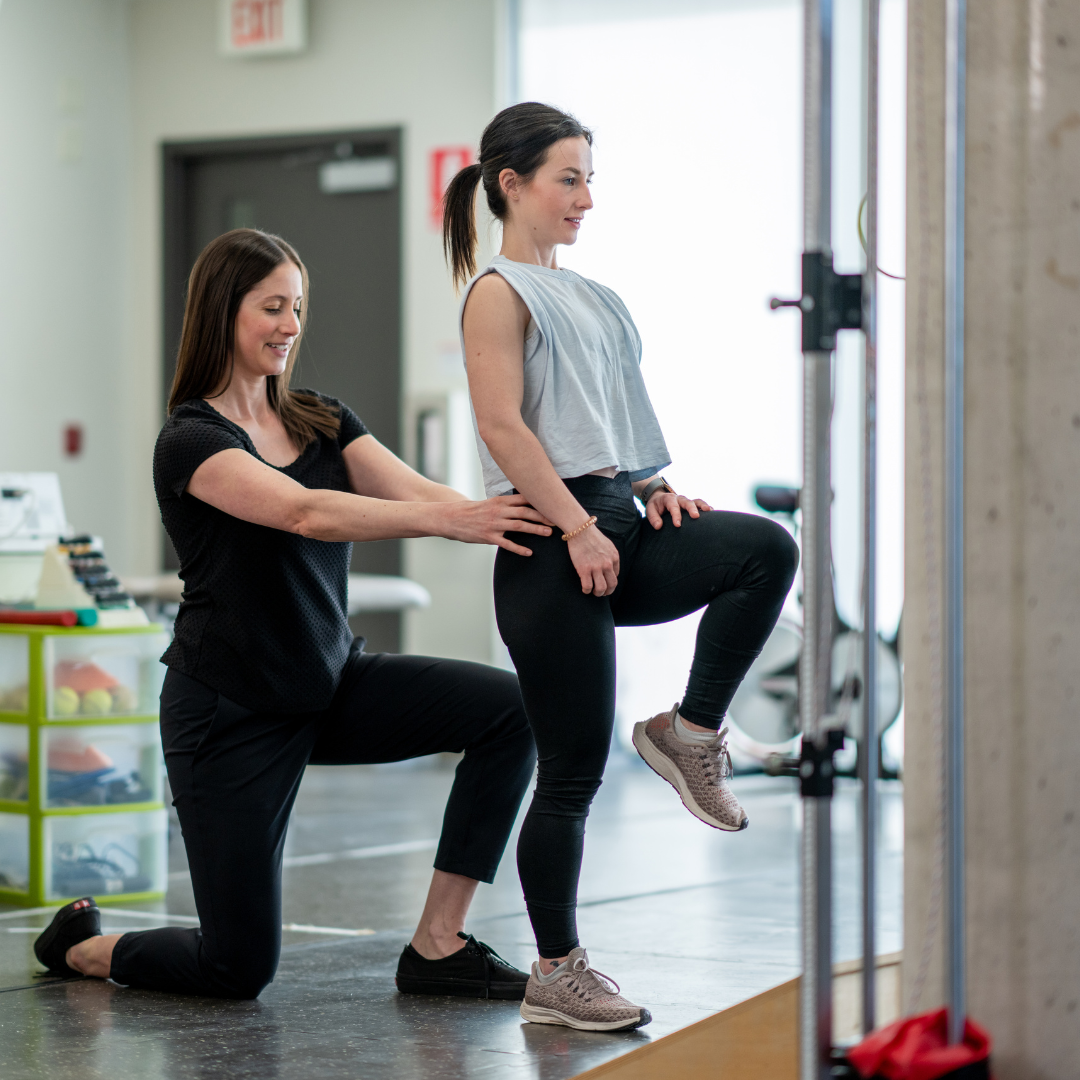
Physio for Pelvic Girdle Pain (PGP)
Treatment
Gentle, Effective Support for Pelvic Girdle Pain During and After Pregnancy
Pelvic Girdle Pain (PGP) affects 20-50% of pregnant women. It can be very painful and debilitating, and get in the way of simple movements that we usually take for granted, such as walking, getting in and out of a car and rolling over in bed.
At Vitalis Physio, we offer expert, individualised care to help manage symptoms, optimise strength and ease groin pain during pregnancy. We can also help after pregnancy, if you have suffered with PGP while pregnant and would like help with a structured return to sport or running.
Whether you are pregnant or post-partum, our tailored pelvic girdle pain physio treatments can help you regain comfort and ease of movement.
What is Pelvic Girdle Pain?
Pregnancy-related Pelvic Girdle Pain refers to discomfort in the joints and ligaments of the pelvis, including the sacroiliac joints and the pubic symphysis at the front of the pelvis. Most frequently, it arises in the second or third trimester of pregnancy, but can occur in the first trimester, especially if you have suffered with it in previous pregnancies. While it is often associated with pregnancy, it can occur postpartum or due to other biomechanical factors.
PGP Symptoms may include:
Pain in the hips, lower back, buttocks or groin
Pain when walking, climbing stairs or rolling over in bed
Pain that worsens throughout the day
Our goal is to keep you active, minimise discomfort and enable you to enjoy your pregnancy with confidence.
Specialist Pelvic Physiotherapy
Pregnancy brings incredible changes to the body, but it can leave you vulnerable to discomfort. Our treatment for PGP combines gentle hands-on therapy with targeted, lightweight strengthening exercises to support your body safely throughout pregnancy.
We use:
Gentle, hands-on therapy to ease pain
Pelvic, hip and core stability exercises
Advice on posture, movement and activity modification
Postnatal Physiotherapy for Pelvic Girdle Pain
If you have had your baby and are still struggling with PGP, know that you're not alone. At Vitalis, we can help.
Our treatment focuses on gently restoring normal pelvic and hip mechanics with hands-on techniques, restoring strength with gentle exercises and correcting any imbalances. This will allow you to enjoy your little one with confidence in your own body.
We can also support you and help optimise your post-natal fitness, enabling you to return to running or sport when you’re ready.
We offer:
Soft tissue release to reduce pain
Gentle joint mobilisations to improve movement if required
Pelvic, hip and core stability exercises
Progressive strength and conditioning exercises
Advice on return to running and sport
Holistic Physio for Pelvic Girdle Pain
Individualised and evidence-driven
Your treatment plan will be built around your presentation, symptoms and activity levels. Giving you relief from pain and restoring movement and confidence.
A whole-body approach
We treat more than just the symptoms. We take a holistic view to restore long-term function and comfort.
Support for every stage
Whether you're early in pregnancy, a new mum or have struggled with pelvic girdle pain for years, we guide you through each step with the right support at the right time.
Safe return to activity
We help you regain the confidence to return to physical activity, work, and family life, whether that means walking pain-free, lifting your baby, or going for a run again.

Ready to Feel Strong, Supported, and Pain-Free?
If you're experiencing pelvic pain during or after pregnancy, don't wait to seek help. Our expert physiotherapy at Vitalis Physio can guide you toward lasting relief with care that’s tailored to your body and lifestyle. Vitalis Physio is conveniently located at The Caversham Golf Club, Reading and Watlington Wellness Centre, right in the heart of Watlington. Easily commutable from across Reading, South Oxfordshire and the Chilterns, with dedicated parking.
Email: info@vitalisphysio.com
Address: The Caversham, Mapledurham, RG4 7UT
Address: 1 Cuxham Road, Watlington, OX49 5JW
Phone: 07432 690233
Physiotherapy for Pelvic Girdle Pain
Frequently Asked Questions
-
PGP in pregnancy is typically caused by hormonal changes that soften the ligaments, combined with physical changes in posture and a less advantageous weight-to-muscle ratio. As your pelvic bones and joints become more mobile, pain, especially in the front of your pelvis, can occur.
-
Yes, pregnant women frequently experience pelvic pain in the second and third trimesters. It can vary in severity, but with the right care, symptoms can be managed.
-
In some cases, a pelvic support belt or taping may be helpful to provide external stability to the pelvis and ease discomfort.. We can assess whether this would benefit you.
-
Women with PGP often report difficulty walking, sleeping or performing daily tasks, taking some of the joy out of their experience of pregnancy. Early treatment can help relieve symptoms and improve your comfort and function.
-
Your pelvic floor muscles play a vital role in stabilising the pelvis and supporting your spine. Strengthening them is often a key part of our treatment plan to improve stability and reduce pain.
-
Most PGP symptoms resolve within days of giving birth, but some women continue to experience symptoms. Our pelvic girdle pain treatments are designed to help you recover fully and return to your normal activity levels safely.
-
Yes - with guidance. Physical activity is important, but it must be adapted to your condition. We provide modified exercises and movements that keep you active without aggravating pain.
-
Unfortunately, PGP can reoccur in subsequent pregnancies, often presenting earlier in each subsequent pregnancy. However, if you prepare for pregnancy and are strong in your hip, pelvis and abdominal muscles, there is a good chance you can stave off symptoms for longer. Come and see us for early intervention.



